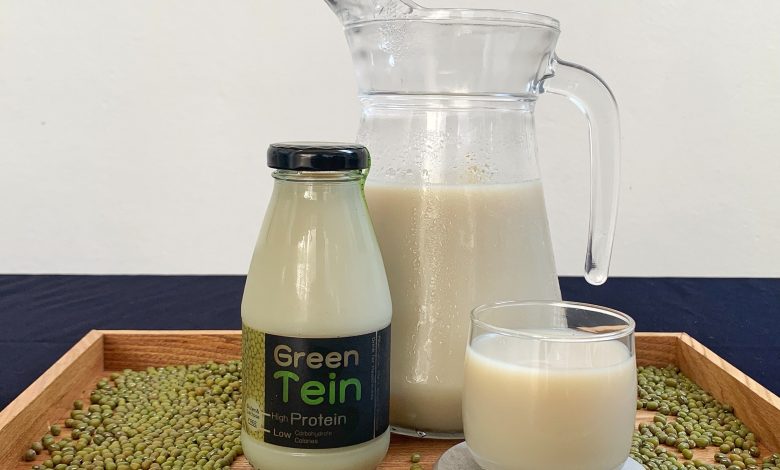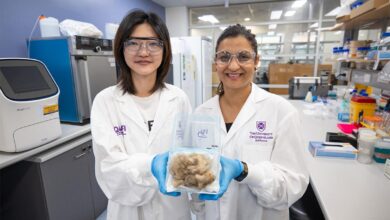Thammasat launched ‘GreenTein’, a protein drink made from ‘Mung Bean’, low in calories and high in benefits

Faculty of Science and Technology, Thammasat University (SCITU) launched “GreenTein”, a new alternative protein drink extracted from 100% mung beans, targeting the health-conscious market and those who are allergic to gluten-lactose and vegan. Its unique features is not containing compounds that cause allergies, flatulence, diarrhea, indigestion and is tested for effectiveness in the lab. From the taste test, it was found that ‘GreenTein is easier to drink than soy milk with a slightly sweet taste, added no artificial flavor, and is low in calories’ which further underscores its potential with a gold medal from the ITEX 2023 invention and innovation contest under SDG2 conditions, aiming to eliminate all forms of hunger and starvation.
Assoc. Prof. Dr. Theppanya Charoenrat, Lecturer in Biotechnology Department, Faculty of Science and Technology, Thammasat University said that the Faculty of Science and Technology, Thammasat University launched ‘GreenTein’, an alternative protein drink extracted from ‘Mung Beans’ for health lovers, vegans or vegetarians, including consumers who are allergic to gluten from cereals and lactose in milk. It was derived by an inspiration to seek for a new source of protein as a replacement to ‘soy’ which has high nutritional value but has a distinct smell. According to the study, it was found that ‘mung beans’ had a mild natural aroma. The protein content is about 24%, while soybeans have a protein content of about 34%. In addition, mung beans are also rich in minerals and a variety of vitamins, dietary fiber and antioxidants in the ‘Phenolic Compounds’ group, including being gluten-free. In addition, it was found that mung bean is a cereal that has a cooling property and is one of the wisdom from generation to generation that has been used as ‘ancient medicinal foods’ that intervene in food cultures of various nationalities such as Chinese and Korean.
‘GreenTein’ or ‘Alternative plant-based protein drink for healthiness’ passed a nutritional analysis as well as sensory test which found that one bottle of ‘GreenTein’ (240 ml.) contains 5.3 grams of protein. When compared, the same volume of cow’s milk contains 8.0 grams of protein. However, thanks to the developed manufacturing process, ‘GreenTein’ is low in calories with only 1.7 carbohydrates and only 0.2 grams of fat, which is less than cow’s milk that has up to 12 grams of carbohydrates and up to 9 grams of fat.
Apart from that, with its unique aroma and slightly sweet taste, ‘GreenTein’ is another choice for plant-based protein consumers. However, ‘GreenTein’ is a product derived from bringing green beans through an enzyme technology process to change the composition in mung beans to be easily absorbed, naturally sweet without added sugar or sweeteners. Such a process received a petty patent under the collaboration with the research team of the Faculty of Science and Technology, Thammasat University and Assoc. Prof. Dr. Sroisuda Pornpakdeewattana, Faculty of Agro-Industry (Fermentation Technology), King Mongkut’s Institute of Technology Ladkrabang (KMITL).
Prof. Dr. Theppanya added that ‘GreenTein’ was able to win the gold medal from “The 34th International Invention, Innovation & Technology Exhibition” (ITEX 2023) in Kuala Lumpur, Federation of Malaysia under the conditions of innovative development with environmental and social considerations, including sustainable development, SDG 2: Zero Hunger aims to eliminate all forms of hunger and starvation. ‘Protein’ is an essential nutrient for the body, especially in childhood and the elderly. Protein promotes healthy childhood development while the elderly, if lacking in protein nutrients, may result in loss of muscle mass, have muscle weakness, dementia and eventually lead to Alzheimer’s disease. It is expected that in 2030, Thailand will have up to 1,117,000 Alzheimer’s patients. Therefore, the research team brought mung beans to develop a bottled plant-based protein drink to provide more options and support people’s diverse protein needs.




